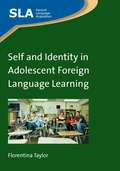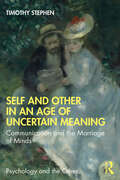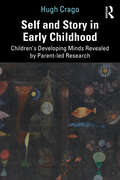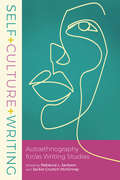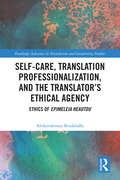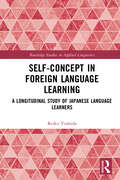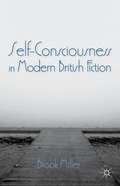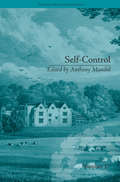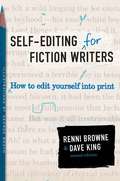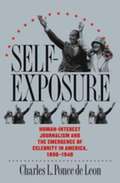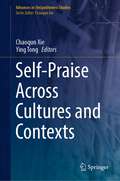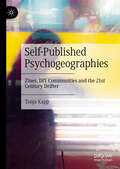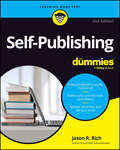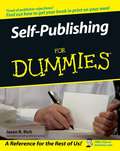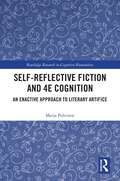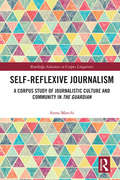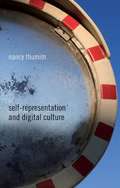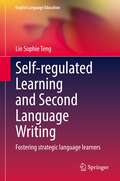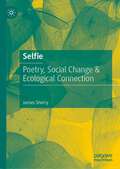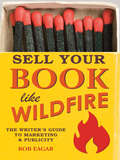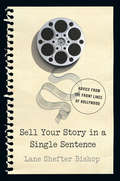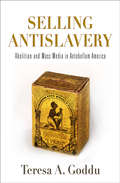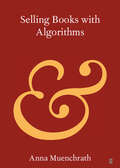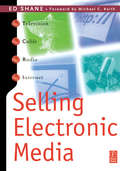- Table View
- List View
Self and Identity in Adolescent Foreign Language Learning
by Florentina TaylorThis book explores the role of identity in adolescent foreign language learning to provide evidence that an identity-focused approach can make a difference to achievement in education. It uses both in-depth exploratory interviews with language learners and a cross-sectional survey to provide a unique glimpse into the identity dynamics that learners need to manage in their interaction with contradictory relational contexts (e.g. teacher vs. classmates; parents vs. friends), and that appear to impair their perceived competence and declared achievement in language learning. Furthermore, this work presents a new model of identity which incorporates several educational psychology theories (e.g. self-discrepancy, self-presentation, impression management), developmental theories of adolescence and principles of foreign language teaching and learning. This book gives rise to potentially policy-changing insights and will be of importance to those interested in the relationship between self, identity and language teaching and learning.
Self and Other in an Age of Uncertain Meaning: Communication and the Marriage of Minds (Psychology and the Other)
by Timothy StephenSelf and Other in an Age of Uncertain Meaning explores the nature and origins of widespread problems of self in modern societies. It examines the paradoxical interplay between the modern world's many benefits and freedoms, and its mounting social challenges and psycho-emotional impacts. Over time the character of consciousness has shifted in concert with societal trends. The experienced world has become more nuanced, fragmented, and uncertain, as well as increasingly personal and intimate, reshaping social relationships. Chapters analyze the interdependence of language, mind, intimacy, the self, and culture, arguing that as the coevolution of these five factors produced the modern world, many features of contemporary culture have become disruptive to security of being. The book explores the importance to the vital sense of self in constructing relationships based in mutual recognition of moral and intellectual equality between partners.Rich with examples from everyday experience, this text offers profound insights for those interested in sociology, psychoanalysis, psychology, communication, history, and culture.
Self and Soul: A Defense of Ideals
by Mark EdmundsonIn a culture of the Self that has become progressively more skeptical and materialistic, we spare little thought for the great ideals--courage, contemplation, and compassion--that once gave life meaning. Here, Mark Edmundson makes an impassioned attempt to defend the value of these ancient ideals and to resurrect Soul in the modern world.
Self and Story in Early Childhood: Children’s Developing Minds Revealed by Parent-led Research
by Hugh CragoOur children grow up into a world of stories—in books, on screens—but what do they make of the stories we offer them? What do they think and feel as they listen to a parent read a picture-book? What if a story confuses or upsets them? Over the past fifty years, several intelligent, committed mothers undertook the onerous task of recording exactly what their children said and did in response to the stories they shared. Some of their records extended over five years, or even longer. Their research, done without funding or academic supervision, offers us unparalleled insight into children’s minds long before they learn to speak—let alone learn to read. In Self and Story in Early Childhood, Hugh Crago draws on his unusual combination of expertise in literary studies, developmental psychology and psychotherapy to re-examine the startling implications of this neglected body of evidence. He highlights how much children can achieve without formal teaching, but with the supportive presence of a trusted adult who will participate with them in the story experience. This book will be of great interest to scholars of developmental psychology, early literacy and narratology, as well as to professionals working with preschoolers. Most of all, it will fascinate parents who themselves share stories with their child.
Self+Culture+Writing: Autoethnography for/as Writing Studies
by Rebecca Jackson Jackie Grutsch McKinneyLiterally translated as “self-culture-writing,” autoethnography—as both process and product—holds great promise for scholars and researchers in writings studies who endeavor to describe, understand, analyze, and critique the ways in which selves, cultures, writing, and representation intersect. Self+Culture+Writing foregrounds the possibility of autoethnography as a viable methodological approach and provides researchers and instructors with ways of understanding, crafting, and teaching autoethnography within writing studies. Interest in autoethnography is growing among writing studies scholars, who see clear connections to well-known disciplinary conversations about personal narrative, as well as to the narrative turn in general and social justice efforts in particular. Contributions by authors from diverse backgrounds and institutional settings are organized into three parts: a section of writing studies autoethnographies, a section on how to teach autoethnography, and a section on how ideas about autoethnography in writing studies are evolving. Self+Culture+Writing discusses the use of autoethnography in the writing classroom as both a research method and a legitimate way of knowing, providing examples of the genre and theoretical discussions that highlight the usefulness and limitations of these methods. Contributors: Leslie Akst, Melissa Atienza, Ross Atkinson, Alison Cardinal, Sue Doe, Will Duffy, John Gagnon, Elena Garcia, Guadalupe Garcia, Caleb Gonzalez, Lilly Halboth, Rebecca Hallman Martini, Kirsten Higgins, Shereen Inayatulla, Aliyah Jones, Autumn Laws, Soyeon Lee, Louis M. Maraj, Kira Marshall-McKelvey, Jennifer Owen, Tiffany Rainey, Marcie Sims, Amanda Sladek, Trixie Smith, Anthony Warnke
Self-Care, Translation Professionalization, and the Translator’s Ethical Agency: Ethics of Epimeleia Heautou (ISSN)
by Abderrahman BoukhaffaThis book draws on an interdisciplinary approach to investigate the impact of codes of ethics as prescribed in translator organizations, proposing alternative ethical pathways grounded in self-care ethics to enhance translators’ symbolic recognition and ethical agency.The volume seeks to provide a counterpoint to existing views in translation studies research on ethics by building on work in sociology and philosophical genealogy, particularly Foucault’s notion of Epimeleia Heautou, to establish a framework of self-care ethics. Featuring analyses of various codes of ethics across different professional associations, the book offers a critical examination of the potential impact of codified ethics on translator autonomy and symbolic status and in turn, their broader social and planetary responsibilities within their roles as translators beyond the translation community. In setting out an alternative charter of ethics which promotes a culture of the self within larger institutions and critical pedagogy within translator education programs, the volume charts new directions in emergent debates on ethics in translation practice.This book will appeal to scholars in translation and interpreting studies, particularly those interested in ethics and sociological and philosophical approaches within the discipline.
Self-Concept in Foreign Language Learning: A Longitudinal Study of Japanese Language Learners (Routledge Studies in Applied Linguistics)
by Reiko YoshidaThis book explores self-concept in foreign language (FL) learning, tracing the trajectories of a group of Japanese language learners at an Australian university to illuminate new insights about the factors impacting positive self-concept and implications for language learning more broadly.The volume calls attention to the ways in which learners’ perception of themselves as FL learners plays a fundamental role in FL learning. Drawing on data from a longitudinal study, including student diaries, interviews and classroom observations, Yoshida outlines shifts in self-concept as learners progress from secondary school to university courses to study abroad and beyond. The book demonstrates how the learner journey is marked by a growing recognition of the importance of practice for achievement but also a greater sense of self-consciousness, with learners’ agency in creating opportunities for themselves to practice their FL as a key factor in improving self-concept over time. This work offers unique observations about self-concept for learners who already ‘have’ global English as a first language, inspiring ways forward for future research and language teaching in other under-studied languages. The book will appeal to students and researchers in applied linguistics, SLA and foreign language learning, as well as stakeholders in Japanese language programs.
Self-Consciousness in Modern British Fiction
by Brook MillerThis book uncovers representations of self-consciousness in selected modern British novels. In these works, self-consciousness complicates character development. Miller records the experience of dualism in worksby authors such asConrad, Joyce, and D. H. Lawrence in order todemonstratethe emergence of a self who feels split from the world. This work explores the development of British modernismalongsidecognitive approaches to literature. "
Self-Control: by Mary Brunton (Chawton House Library: Women's Novels #17)
by Anthony MandalSelf-Control (1811) was a literary sensation, going into four editions in its first year. The first novelist to set her story against a strong Scottish background, Brunton set the scene for other writers such as Walter Scott. Jane Austen was also a fan, she read it at least twice, worrying that the work might foreshadow her own creations.
Self-Editing for Fiction Writers, Second Edition
by Dave King Renni BrowneHundreds of books have been written on the art of writing. Here at last is a book by two professional editors to teach writers the techniques of the editing trade that turn promising manuscripts into published novels and short stories. In this completely revised and updated second edition, Renni Browne and Dave King teach you, the writer, how to apply the editing techniques they have developed to your own work. Chapters on dialogue, exposition, point of view, interior monologue, and other techniques take you through the same processes an expert editor would go through to perfect your manuscript. Each point is illustrated with examples, many drawn from the hundreds of books Browne and King have edited.
Self-Exposure
by Charles L. Ponce de LeonFew features of contemporary American culture are as widely lamented as the public's obsession with celebrity--and the trivializing effect this obsession has on what appears as news. Nevertheless, America's "culture of celebrity" remains misunderstood, particularly when critics discuss its historical roots. In this pathbreaking book, Charles Ponce de Leon provides a new interpretation of the emergence of celebrity. Focusing on the development of human-interest journalism about prominent public figures, he illuminates the ways in which new forms of press coverage gradually undermined the belief that famous people were "great," instead encouraging the public to regard them as complex, interesting, even flawed individuals and offering readers seemingly intimate glimpses of the "real" selves that were presumed to lie behind the calculated, self-promotional fronts that celebrities displayed in public. But human-interest journalism about celebrities did more than simply offer celebrities a new means of gaining publicity or provide readers with the "inside dope," says Ponce de Leon. In chapters devoted to celebrities from the realms of business, politics, entertainment, and sports, he shows how authors of celebrity journalism used their writings to weigh in on subjects as wide-ranging as social class, race relations, gender roles, democracy, political reform, self-expression, material success, competition, and the work ethic, offering the public a new lens through which to view these issues.
Self-Praise Across Cultures and Contexts (Advances in (Im)politeness Studies)
by Chaoqun Xie Ying TongThis book explores the extent to which self-praise is acceptable in both offline and online contexts, across different genres, platforms, and cultural backgrounds. The data analyzed encompass both naturally occurring (daily conversation as well as institutional talk) and elicited (experiments and interviews) types, and are explored at both quantitative and qualitative levels to offer a relatively systematic and comprehensive inquiry into self-praise as social (inter)action. Contributors to this book not only draw on traditional politeness theories but are also informed by social psychology, interactional sociolinguistics, CMC, and (multimodal) discourse analysis. They are inspired by pragmatics but also go beyond to ground their studies within locally situated cultural contexts, most of which are under-presented in the current academic world. Their efforts substantiate the fact that self-praise is most worthy of intensive analytic attention. This book appeals to students and researchers in the field and contributes to the way communication is facilitated through different ways of deploying linguistic and interactional resources.
Self-Published Psychogeographies: Zines, DIY Communities and the 21st Century Drifter
by Tanja KappThis book explores the world of psychogeographical walking as portrayed in zines – self-made, low-budget publications circulated within DIY communities. Termed "new psychogeography", the representation of these mobilities in zines challenge conventional dualisms, favoring peripheral spaces and polyphonic perspectives over urban-centric voyeurism. Through four case studies, the book explores the evolution of the contemporary drifter, emphasizing a departure from conquering cityspaces through stalking to exploring how spaces shape memory, experience, and notions of home. Pioneering research at the intersection of zine and travel writing studies, it unveils the psychogeographical mediality inherent to this medium.
Self-Publishing For Dummies
by Jason R. RichGet your books into the hands of readers with this simple how-to guide Self-Publishing For Dummies takes you through the entire process of publishing your own books, starting with the writing and editing process and moving through cover design, printing options, distribution channels, and marketing to a target audience. With the advice in this book, you can tackle self-publishing, no matter what genre you write in. You’ll learn how to retain full control over your work and keep the profits from the sales of your book. In this updated edition, you’ll discover the latest technologies in self-publishing, trends in the world of ebooks, and new marketing techniques you can use online and in the real world. Becoming a published author is easier than ever, thanks to this Dummies guide. Understand every step in the self-publishing process Discover how to write and sell your books in ebook and printed formats Hire an editor, obtain an ISBN, and generate publicity for your book Fine-tune your writing to improve your chances of success Get your work out there—no agent or publisher neededSelf-Publishing For Dummies is the perfect choice for anyone with an interest in DIY publishing.
Self-Publishing For Dummies (For Dummies Ser.)
by Jason R. RichCovers budgeting, copyrighting, and marketing Know the pros and cons of self-publishing and get your work in print Thinking about self-publishing your book? This no-nonsense guide walks you through the entire process of going it alone, from preparing your manuscript and creating the perfect title to selling the final product. You'll see how to obtain an ISBN, work with printers and distributors, create a buzz with publicity, and take advantage of electronic publishing. Discover how to * Start your own publishing company * Edit your work effectively * Design and format your book * Hire skilled professionals to help * Manage outside vendors * Build awareness for your book online
Self-Reflective Fiction and 4E Cognition: An Enactive Approach to Literary Artifice (Routledge Research in Cognitive Humanities)
by Merja PolvinenThis book brings together the study of self-reflective fiction and the contemporary 4E theories of cognition in order to challenge existing cognitive-theoretical models and approaches to literary phenomena. Polvinen presents reflective attention on artifice as an integral part of engagement with fictional narratives, rather than as an external viewpoint that would obscure immersive experiences. The detailed analyses included are both of traditionally metafictional texts by John Barth, A.S. Byatt, Dave Eggers, and Ali Smith, as well as of speculative fictions by Ted Chiang, China Miéville, Christopher Priest, and Catherynne M. Valente. Each of the chapters focuses on a specific issue of fictional cognition: on metaphorical representation, spatiality, temporality, and fictionality. As a whole, the book argues that by combining a literary and theoretically complex view of artifice with the enactive paradigm of perception and imagination, practitioners of cognitive literary studies can further sharpen their own conceptual and terminological apparatus and continue to generate fruitful hermeneutic circulation around the study of the imagination in both the sciences and the humanities. This book will appeal to students and scholars interested in cognitive approaches to literary studies, speculative fiction, metafiction, and narrative studies.
Self-Reflexive Journalism: A Corpus Study of Journalistic Culture and Community in the Guardian (Routledge Advances in Corpus Linguistics)
by Anna MarchiThis book develops a corpus-assisted approach to the study of self-reflexivity in journalism and examines the ways in which news workers and subsequently, news organizations, choose to promote an identity for themselves and the ideologies that accompany them. Using The Guardian as a case study, the volume draws on its Corpus Assisted Discourse Studies (CADS) to explore ways in which a newspaper can reflect upon itself, including how newspapers conceptualize the role of the media, how they define good vs. bad journalism, what they see as professional values, how they attempt to cement community membership amongst their readers, how they construct and project their overall identity and role as newspapers and also how they see their position within the larger community. A chapter on the book’s methodological framework reflects on critical aspects of CADS, including triangulation, objectivity and subjectivity, total accountability, and replicability. CADS methods are applied in the analysis chapters, with accompanying reflections on what we learn about the strengths and also maybe about some of the limitations of corpus methodology. A summarizing chapter ties these strands together to make the case for a CADS approach to journalism and media studies and look to the future at how the digital age has shaped the journalism landscape. With its focus in extending a CADS approach to other aspects of journalism scholarship, this volume is key reading for graduate students and researchers in corpus linguistics, discourse analysis, media studies, and journalism studies.
Self-Representation and Digital Culture
by Nancy ThumimTaking a close look at ordinary people 'telling their own story', Thumim explores self-representations in contemporary digital culture in settings as diverse as reality TV, online storytelling, and oral histories displayed in museums. Now available in paperback, Self-Representation and Digital Culture addresses the institutional contexts of production, technology and form of the texts, and the point of view of those who represent themselves. This highly original research examines how contradictory and widely different politics inform and shape examples of 'speaking for oneself'. In the book, Thumim argues that analysis and theorization of the activity of self-representation is vital for media, communication and cultural studies at a time when examples, of what should now be understood as a genre, both surround us and appear, at first glance, to all be alike.
Self-regulated Learning and Second Language Writing: Fostering strategic language learners (English Language Education #26)
by Lin Sophie TengThis monograph is to investigate practical applications and contributions of self-regulated learning (SRL) to second/foreign language (L2) writing from sociocognitive and sociocultural perspectives. It showcases a comprehensive and updated review of conceptual and methodological issues of SRL and the state-of-the-art research on its applications to L2 learning and teaching. This volume further elaborates the design and results of a large-scale project which conducts observational and intervention studies investigating SRL strategies in L2 writing. This book reveals that a cross-disciplinary understanding of SRL strategies plays a crucial role in advancing theoretical functions of SRL and in extending its applications to L2 education in general, and L2 writing in particular. This book makes significant contributions to developing and validating new conceptual frameworks and tools for evaluating multidimensional structures of SRL strategies and self-efficacy in L2 writing; elucidating the interplay of personal, behavioral, environmental and psychological factors with SRL strategies and writing performance; and presenting an effective self-regulation instructional model for nurturing L2 learners’ motivation and confidence to strategize, reflect and succeed in writing.Teng has established herself as one of the prominent scholars in the discussion of self-regulated learning strategies. Her contribution to the fields of L2 writing and strategic learning are undeniable. This monograph is an excellent showing of how her endeavors to bring established theories from educational psychology to applied writing research have progressed over a number of methodologically rigorous studies. It should be required reading for anyone with an interest in cultivating strategic writers not only in the Chinese context but worldwide. Nathan Thomas, UCL Institute of Education
Selfie: Poetry, Social Change & Ecological Connection
by James SherrySelfie: Poetry, Social Change & Ecological Connection presents the first general theory that links poetry in environmental thought to poetry as an environment. James Sherry accomplishes this task with a network model of connectivity that scales from the individual to social to environmental practices. Selfie demonstrates how parts of speech, metaphor, and syntax extend bidirectionally from the writer to the world and from the writer inward to identities that promote sustainable practices. Selfie shows how connections in the biosphere scale up from operating within the body, to social structures, to the networks that science has identified for all life. The book urges readers to construct plural identifications rather than essential claims of identity in support of environmental diversity.
Sell Your Book Like Wildfire: The Writer's Guide to Marketing & Publicity
by Rob EagarPromote and Sell Your Work! You've written a book, but if it doesn't sell, what's the point? InSell Your Book Like Wildfire, marketing expert Rob Eagar explains how to use the best promotional methods available to get your book noticed and drive sales. You'll learn how to: Increase your book sales by driving readers to bookstores and online retailers Build a brand that makes your books stand out from the crowd Secure more media interviews and speaking engagements Connect with key influencers who spread word of mouth Create raving fans who buzz about your book on social media Ignite your confidence to sell more books and make more money as an author. Whether you're a first-timer or an old-hand, self-published or traditionally published, a novelist or non-fiction writer, this is the only marketing guide you'll ever need.
Sell Your Story in A Single Sentence: Advice from the Front Lines of Hollywood
by Lane Shefter BishopEvery writing project has one thing in common--they all start with a single sentence. Writers constantly struggle to answer this question: What is your story about? Finally, a guide by a leading Hollywood insider who actually knows the answer--and now she shows you how to do it yourself! Lane Shefter Bishop, CEO of Vast Entertainment, explains the key to selling your screenplay, novel, or script. This comprehensive guide to opening career doors is the first of its kind, highlighting the tips and techniques for making your story stand out. From tips on character development to hints on points to avoid, Bishop covers all your bases when selling your story.
Selling Antislavery: Abolition and Mass Media in Antebellum America (Material Texts)
by Teresa A. GodduA richly illustrated history of the American Anti-Slavery Society and its print, material, and visual artifactsBeginning with its establishment in the early 1830s, the American Anti-Slavery Society (AASS) recognized the need to reach and consolidate a diverse and increasingly segmented audience. To do so, it produced a wide array of print, material, and visual media: almanacs and slave narratives, pincushions and gift books, broadsides and panoramas. Building on the distinctive practices of British antislavery and evangelical reform movements, the AASS utilized innovative business strategies to market its productions and developed a centralized distribution system to circulate them widely. In Selling Antislavery, Teresa A. Goddu shows how the AASS operated at the forefront of a new culture industry and, by framing its media as cultural commodities, made antislavery sentiments an integral part of an emerging middle-class identity. She contends that, although the AASS's dominance waned after 1840 as the organization splintered, it nevertheless created one of the first national mass markets.Goddu maps this extensive media culture, focusing in particular on the material produced by AASS in the decade of the 1830s. She considers how the dissemination of its texts, objects, and tactics was facilitated by the quasi-corporate and centralized character of the organization during this period and demonstrates how its institutional presence remained important to the progress of the larger movement. Exploring antislavery's vast archive and explicating its messages, she emphasizes both the discursive and material aspects of antislavery's appeal, providing a richly textured history of the movement through its artifacts and the modes of circulation it put into place.Featuring more than seventy-five illustrations, Selling Antislavery offers a thorough case study of the role of reform movements in the rise of mass media and argues for abolition's central importance to the shaping of antebellum middle-class culture.
Selling Books with Algorithms (Elements in Publishing and Book Culture)
by Anna MuenchrathIn 1997 Amazon started as a small online bookseller. It is now the largest bookseller in the US and one of the largest companies in the world, due, in part, to its implementation of algorithms and access to user data. This Element explains how these algorithms work, and specifically how they recommend books and make them visible to readers. It argues that framing algorithms as felicitous or infelicitous allows us to reconsider the imagined authority of an algorithm's recommendation as a culturally situated performance. It also explores the material effects of bookselling algorithms on the forms of labor of the bookstore. The Element ends by considering future directions for research, arguing that the bookselling industry would benefit from an investment in algorithmic literacy.
Selling Electronic Media
by Ed Shane"Selling is identifying and satisfying customer needs profitably. Profitable for you, profitable for them."Diane Sutter, President and CEO of Shooting Star Broadcasting , owner of KTAB-TV, Abilene, TexasThis is the definition of sales used throughout Ed Shane's comprehensive and timely textbook Selling Electronic Media. This new definition reflects the customer-orientation of today's marketing environment as well as the product-orientation of selling. Today's selling is a win/win proposition, a win for the seller and a win for the customer.Using interviews with industry leaders and reports of their selling experiences, Selling Electronic Media shares insight and practical advice in the basics of selling: · prospecting· qualifying· needs analysis· presentations· answering objections· closing· relationship management Focusing on the merging and converging of electronic media and the need for branding of media at all levels, this highly readable book offers complete coverage of advertising sales for radio, television and cable, plus the new and emerging mass communication technologies, primarily those generated by the Internet.Selling Electronic Media is enhanced with review highlights and discussion points and illustrated throughout with visuals used by media outlets to market commercials and their audience reach.Students pursuing sales and marketing careers in electronic media and professionals wishing to reinforce their understanding of the merging and converging media environment will find what they need in the pages of this book.
